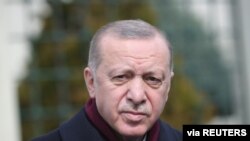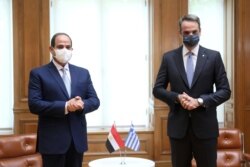Turkish Foreign Minister Mevlut Cavusoglu announced high-level intelligence and diplomatic talks with Egypt on Friday. The bilateral talks are the first since the 2013 ousting of Egyptian President Mohamed Morsi.
The move is an effort by Ankara to counter its growing isolation, says Huseyin Bagci of Turkey's foreign policy institute.
“There is an increasing block, increasing antipathy towards Turkey, Turkey cannot go like this, Israel, Egypt, Saudi Arabia, United Arab Emirates, it is too much,” he said.
Last year, Cairo further turned up the pressure on Ankara, signing a deal with Athens to explore for energy in Mediterranean waters contested by Greece and Turkey. But regional analyst Sinan Ulgen says conciliatory Turkish words towards Egypt are not enough for a diplomatic breakthrough.
Despite the opening towards Egypt, Ulgen said, “ultimately whether this new turn is going to be effective and deliver results does hinge on what Turkey does.”
Ankara's support of the Muslim Brotherhood in Egypt — or, as it's called in Arabic, Ikhwan, which was ousted from power in 2013 by the current President Fattah el-Sisi — remains a key point of tension between the countries, says regional analyst Cem Gurdeniz.
“Egypt right now is acting against Turkey just because of the Turkish government's wrong policy, based on the theological background, like Ikhwan policy,” Gurdeniz said. “When Turkey leaves the religious policy, I am sure Turkey-Egypt relations will be better.”
Turkish President Recep Tayyip Erdogan was a close ally of ousted Egyptian leader Morsi and publicly wept over the Sisi-led crackdown on Morsi's Muslim Brotherhood supporters. Analyst Bagci says Erdogan will have to make painful concessions.
“Tayyip Erdogan and Sisi probably will not shake hands as presidents in the foreseeable future, but Turkey will not (be) supporting Muslim brothers as before,” he said.
With Egypt and Turkey backing rival sides in the recent Libyan civil war and competing for influence in Sudan, analysts suggest Turkish-Egyptian rapprochement could ease regional tensions. But difficult diplomatic talks are predicted, given the recent animosity and distrust between them.





